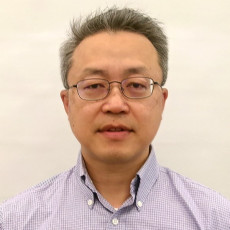Berkeley Lab’s Chao Yang has been named a 2024 Society for Industrial and Applied Mathematics (SIAM) fellow for contributions to the development of novel algorithms and software for eigenvalue problems, as well as applications of algorithms and software to solve challenging scientific problems. His areas of impact include numerical linear algebra, optimization, large-scale data analysis, and high performance computing.
SIAM Fellows are designated each year to recognize community members for their distinguished contributions to the disciplines of applied mathematics, computational science, and related fields. The Fellows Selection Committee selects Fellows based on nominations by SIAM members.
A senior scientist in Berkeley Lab’s Scalable Solvers Group in the Applied Mathematics and Computational Research Division (AMCR), Yang develops efficient algorithms for solving large-scale linear and nonlinear eigenvalue problems and inverse problems in electron microscopy and X-ray sciences. His work has helped chemists and material scientists gain insights into the electronic, structural, and optical properties of molecules comprising tens of thousands of atoms. His algorithms have been used to optimize particle accelerator designs, investigate the nuclear structures of isotopes, and better understand protein structures. Many of his algorithms for electronic structure calculation have also been incorporated into widely used application software such as Quantum-Espresso, NWChem, Q-Chem, and PARSEC.
“It is a great honor to be recognized as a 2024 SIAM Fellow. It means that this community sees the value in my work and contributions to applied mathematics,” said Yang.
Yang received his Ph.D. in computational and applied mathematics from Rice University in 1998. He earned his master’s in math from the University of Kansas in 1994 and a bachelor’s degree in computer science and math from Central Missouri State University in 1992.
About Berkeley Lab
Founded in 1931 on the belief that the biggest scientific challenges are best addressed by teams, Lawrence Berkeley National Laboratory and its scientists have been recognized with 16 Nobel Prizes. Today, Berkeley Lab researchers develop sustainable energy and environmental solutions, create useful new materials, advance the frontiers of computing, and probe the mysteries of life, matter, and the universe. Scientists from around the world rely on the Lab’s facilities for their own discovery science. Berkeley Lab is a multiprogram national laboratory, managed by the University of California for the U.S. Department of Energy’s Office of Science.
DOE’s Office of Science is the single largest supporter of basic research in the physical sciences in the United States, and is working to address some of the most pressing challenges of our time. For more information, please visit energy.gov/science.










